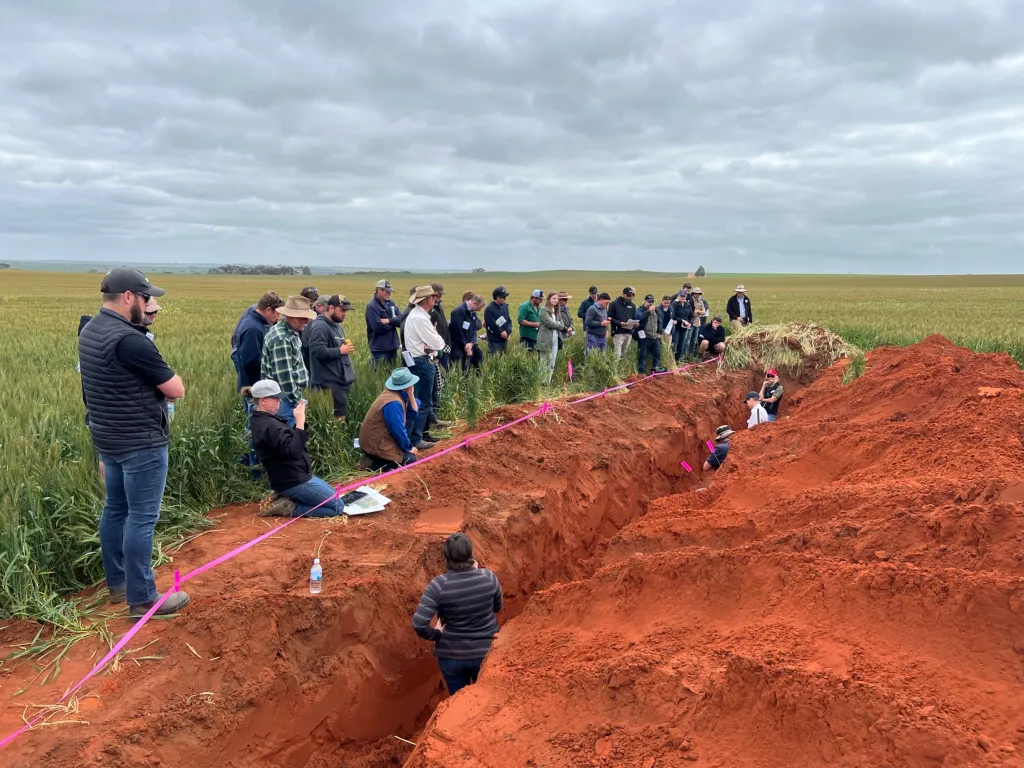Innovative Soil Amendments and Amelioration Methods Discussed at Wathingarra Crop Walk
By Simon Kruger, WMG Project Communications Officer

Last month, a group of 20 local farmers and agricultural industry representatives gathered at the Future Carbon Project long-term trial site on Jeremy Roberts’ Wathingarra Rd property in Badgingarra for another West Midlands Group (WMG) crop walk.
The focus of this discussion event was to review key results from the four years of the project and to engage in conversations and shared learnings around soil amendments, amelioration methods, and building soil carbon and health.
The site, which has historically undergone various cropping and pasture phases, features naturally low pH levels, high soil water repellence, and is prone to wind erosion. With these constraints in mind, much of the conversation centred around soil amendments and amelioration, exploring their potential benefits and practical applications.

One of the highlights was the discussion on compost, specifically C-Wise’s ‘Humicarb’ applied at 15t/ha, with added context provided by C-Wise’s Chris Wieman. This highly processed compost has been the standout performer so far on the site, with the group discussing incorporation and the idea that naturally occurring ‘micros’ in the compost may be contributing to its effectiveness.
Other amendments across the site, such as Zeolite, Ironman Gypsum, clay, frass, and biochar, were also investigated. Knowledgeable input from Murdoch University’s Dr Richard Bell provided added context, detail, and ability for further discussion. As with the conversation around compost, attendees agreed that while there are promising signs, the economics of each of these novel amendments need to be carefully considered. Factors such as freight, availability, and application rates and methods can significantly impact their cost-effectiveness and usefulness.
The three types of soil amelioration carried out across the site—spading, mouldboard plowing, and shallow tillage—were also discussed, with farmers sharing their personal experiences and expertise with these different methods. As with any WMG event, the considered and valuable input from the Plozza brothers, Ben and Sean, supplemented the conversation around all things soil amelioration.

One of the key outcomes of the day was the realisation that there is no ‘magic potion’ of amelioration methods and soil amendments. While the cumulative benefits of each practice are visible, compost as an additive has shown the most promise over the years of the trial, though not significantly.
The event also provided an opportunity for Nathan Rosair from the Department of Primary Industries and Regional Development to review the trial site, having managed the overall Future Carbon Project for the last few years.

Each attendee’s engagement and involvement in different portions of discussions ensured that knowledge sharing was enriched with multiple layers of experience and technical know-how.
The event underscored the importance of understanding the economics and effectiveness of novel soil amendments and their practical applications in broadacre farming. Continued research and field trials will be crucial in optimising these soil management practices for long-term sustainability, with funding secured to continue work on this important site.
For more detailed results from the trial site and the Future Carbon Project, contact WMG or visit the Future Carbon Project webpage.














